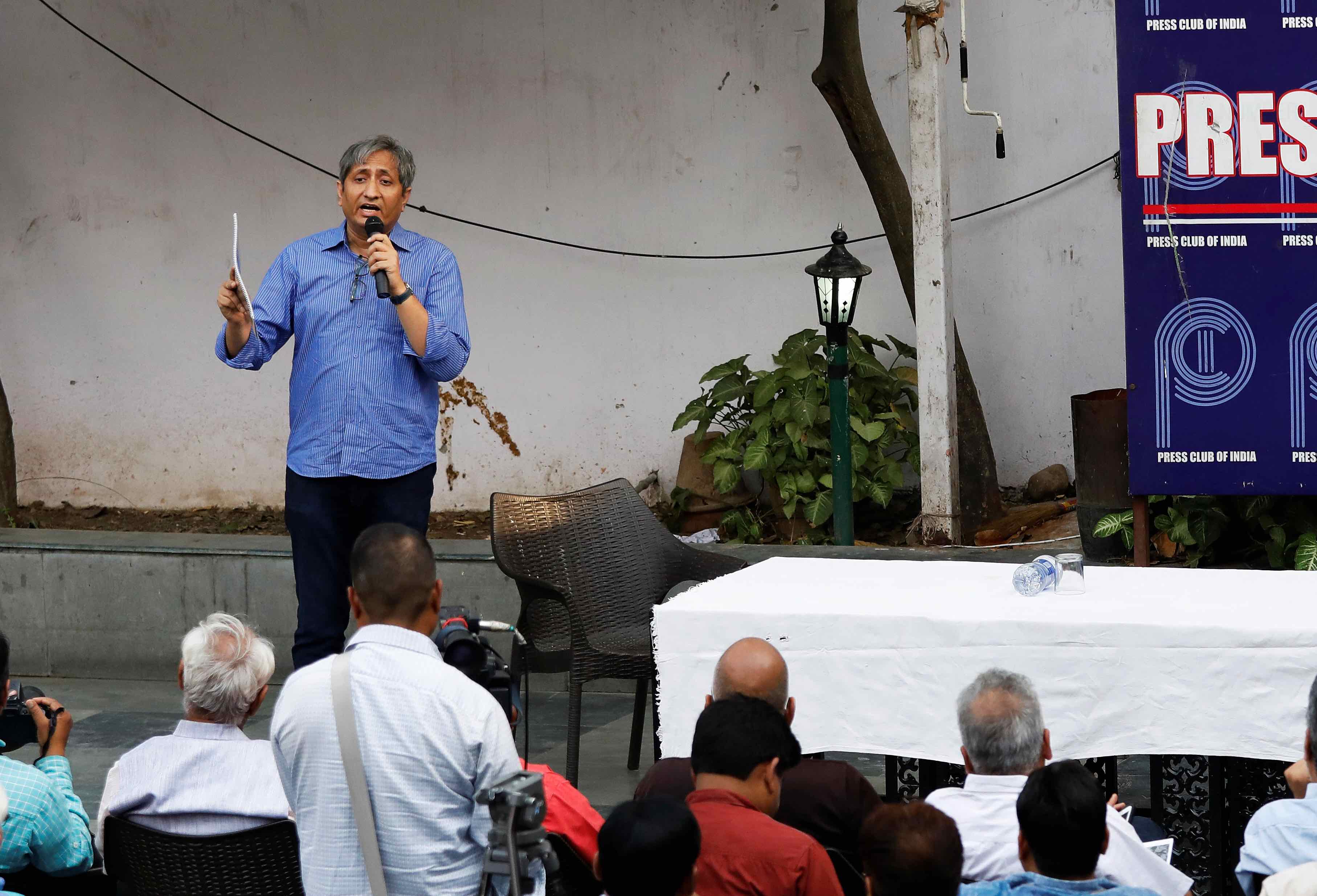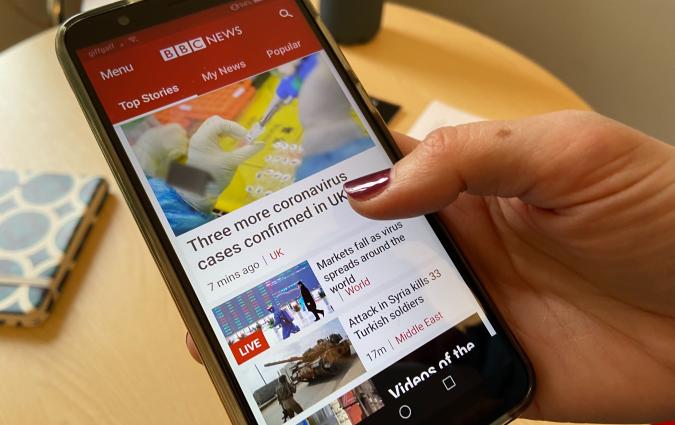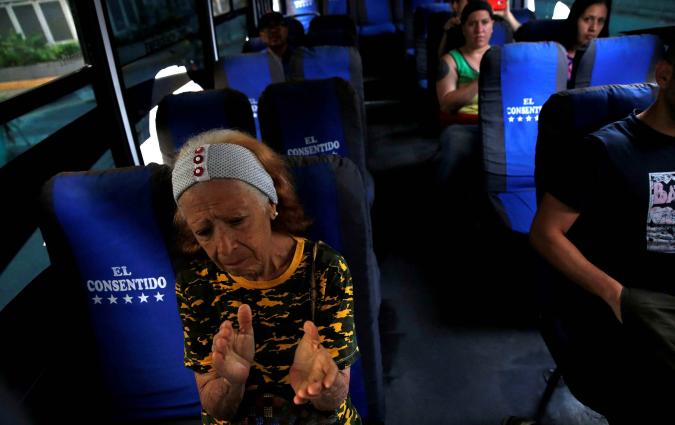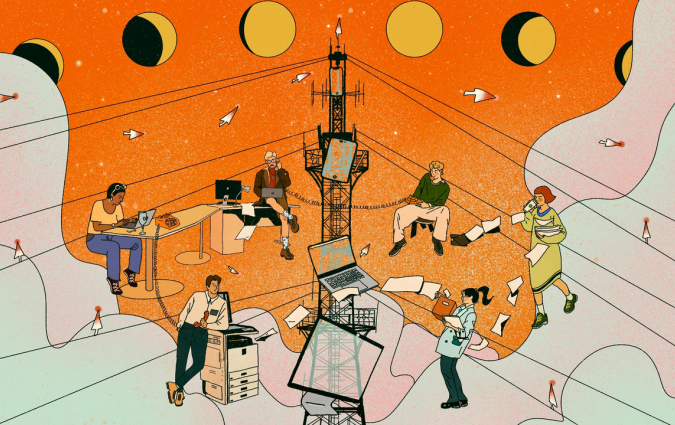“What we have today in India is truly the ‘dark age’ of journalism. Our media ecosystem has been gutted and destroyed”

Ravish Kumar addresses a group of journalists at the Press Club of India in 2018. REUTERS/Saumya Khandelwal
Ravish Kumar is one of the most respected journalists in India. He joined NDTV in 1996, and has anchored several news shows for the outlet, including Ravish ki Report, Des Ki Baat and Prime Time with Ravish. A few hours after it was published that Gautam Adani, the richest man in Asia and a billionaire close to Prime Minister Narendra Modi, was on the verge of taking over NDTV, Kumar announced his resignation on his YouTube channel. Here's a translated transcript of his speech, which we've abridged for brevity and clarity. The video is available in this link.
There was never a golden age in Indian journalism. But it was never as bad as it is today. Every good aspect of journalism is being destroyed rapidly. This was expected. But what we have today is truly the ‘dark age’ of journalism. There are numerous news channels in India but all of them have compromised on their ethics. Our media ecosystem has been gutted and destroyed.
Everyone claims to be a journalist today. Especially those who are close to and even aligned with the powerful. These faces and establishments ironically are the very reason journalism is being trampled upon in this country. They claim to do good journalism. I implore you to be sceptical of them. These unquestioning journalists and even the government want to shove their definition of journalism down your throat.
My memories at NDTV
At this stage, I do not want to say much about the institution I belong to because you cannot be objective while you are emotional. Emotions often overpower facts. So it is better we leave emotions aside.
I have many interesting memories at NDTV. I find it tough to thank one person. When your professional journey has been a contribution of many people, how can you thank only one? I know that many former and current colleagues and collaborators see a part of them in me, and rightfully so. I have taken something from everyone and I am grateful.
When a bride leaves her maternal home, she pines for that home and feeling even as she steps away. I feel like that bride today. Perhaps this is the moment to soak in that feeling. I shall talk about NDTV in a more equivocal tone some day in the future.
NDTV taught me that TV is made by teams. After anchors became stars, this concept was a bit shaken. But even today, I believe that your work is only as good as your team.
In August 1996, I joined NDTV formally as a translator. But even before that, my work at NDTV was to read all the hand-written letters viewers sent. They addressed their letters to anchors of different programmes. While reading them, I saw the creation of TV audiences in the country. My work was to make a report out of those letters and hand it to the producers of every show. I was a daily wage worker back then and got paid accordingly.
Being honest with the audience
I feel like I still do the same work. Even today, thousands of you write to me. I still get hand-written letters from you. I read most of them and respond to as many as I can. I bare myself in front of you all, because I want to be honest about how I feel. If I censored my thoughts, that would be dishonest to you. In one way, I think I have come full circle. The viewers’ feedback letters I once used to read, I still read.
I have lived my life in the midst of all of your suggestions, responses, anticipation, criticisms and even the one-off rebuke. This brought me close to you all. When I was amidst you, I didn't really live for myself. Now, I hope I will find time for that.
I feel like the bird that has lost its nest because someone else snatched it away. But the bird still has the vast sky at its disposal.
I used to translate many reports and stories of correspondents from English to Hindi. Then I became a reporter and produced a daily report called Ravish Ki Report.
Someone whose work was to read letters became the group editor. That was possible only on NDTV. And today, that person tenders his resignation.
There are many powerful people who hold the strings to this institution, so it was obvious that this day would arrive. But now that the day has come, it feels sorrowful.
I just hope that when you evaluate me, you do not pity my humble beginnings. I am not like those who seek sympathy by flaunting their humble beginnings. They suddenly talk about a childhood spent as a petty tea-seller, even as they take expensive flights. I do not think of my journey as an extraordinary one. In this country, everyone has had a tough life. Just talk to the families of the patients admitted to the All India Institutes of Medical Sciences (AIIMS). You will realise they have to scale mountains we can only imagine. In comparison, our miseries are miniscule.
“I tried to work for you”
Today I want to talk to you about TV audiences. Nowadays we’ve all witnessed institutions crash and waves of hatred engulf societies. But I saw a new institution take shape – citizenship. Whenever NDTV gave me an opportunity, I tried to work for you. And I filled up such an opportunity with your stories.
You have a massive claim on me. You created a newsroom for me in your homes and in your minds. All around the world, audiences have come forward to help me. You didn't ask me for money or do it as a favour. Many people recorded my videos, helped me with research. Each of my episodes is a testament to your cooperation. You provided me with information, reprimanded my mistakes and included yourselves in my programmes.
Experts, students, expats and Indians were viewers but also my co-passengers and became journalists of sorts. While doing so, they were saving a small island of journalism.
In that sense, I saw the making of a TV audience and their complete disintegration. And now, I see them stand up as an institution again.
You have translated my work into different languages. Resources have not been available to me always, but you have ensured I have access to them. [My show] Prime Time was your Prime Time. If the show ever fell short, you were prompt to exhibit your disappointment. Audiences have been my regular editors. I always say a person is a sum of all those around him. It is because of you as an audience that Ravish Kumar stands here today.
Thanks to your support, several journalists find themselves on YouTube and Twitter. When you subscribe to many websites, you keep them afloat.
How audiences help journalists
When democratic institutions were weak and courts appeared weak, you stood strong. In these times, you are the biggest institution of journalism. Journalism today lives among enlightened audiences, not in lofty institutions. Your biggest contribution to our times is that you stand by those journalists who ask tough questions.
There might be forces who muzzle the voice of the people, cover it with religious hatred and kill democracy. But some of you give me hope. Because even if democracy dies, the desire for a functioning democracy survives. All thanks to you, responsible audiences.
In these tough times, I feel grateful for those elderly women who pinched my cheek in adoration, for people who gifted me potted plants and gave me nutritious sattu ensuring I always ate healthy. Some held umbrellas over my head to shield me from oppressive heat and others slyly put expensive pens in my pocket.
That’s why today I want to think of all of you. I would have been nothing without all of you. I am proud of you all. Many times, I have felt like your representative, and not as the representative of my organisation.
I was given a lot of unbridled freedom to work. I guarded this freedom as if my life depended on it because I knew I was being watched by you, learned audiences. I ensured I did not err or become arrogant because that would take away my freedom.
I stood at the crease like a batsman in a test match, even as the world changed in front of me. But someone just ended the match and changed the rules.
Every nation has people who take the audiences for granted, and there are some in India as well. If they claim to be giving you facts, it means they want to throw some cents at you while pocketing many dollars themselves. If journalists and news outfits try to expose their wrong-doing, they are slapped with a battery of lawsuits. And the same players then claim glibly that they care about meaningful journalism.
Journalism in Hindi matters
Why can’t many brilliant journalists who work in Hindi share their views with the world? I have been amazed at the depth of their knowledge, but they were never accorded the status they deserved.
In India, [the most respected] journalists are those who work in English media. So I tried to bring respectability to Hindi journalism so that this language kept being important. I tried to make people from all over India fall in love with my Hindi. My mother tongue is Bhojpuri, not Hindi. I walked from the village of Bhojpuri to the massive city of Hindi.
I want to thank all those people from non-Hindi speaking parts of the country who enriched my Hindi. They translated my work into their languages and they also translated their texts into Hindi for me!
I often felt like I was in a caravan where many joined the journey and walked shoulder to shoulder. I don't mean for this to turn into a wrestling match between Hindi and English journalism, so it is important that I note the various contributions of English language journalists in my life.
What journalists are meant to do
Everytime I shared time with the audience, I was taken in by your belief in journalists and your deep understanding of issues. You had so much to say. That is what the government should be listening to.
Journalists are meant to be the medium that takes your voice to the highest levels. I always tried to see the nation through your eyes. Your activism keeps Indian democracy alive. Shaheen Bagh and the farmers' protests strengthened my belief in you. I saw you transform into responsible citizens. You people will make better societies in the future.
Today some believe that they control all major aspects of our society. They believe citizens are dispensable. The media is dead and political opposition is struggling. All of that is true. But such a state is not eternal. One day people will overcome their hatred. They will look for a new society to build and they will think of journalism then.
I learnt to read, write and speak at NDTV. I leant how to wear good clothes and wear a tie. I didn't get to learn to dance, because there was never a free moment.
Lessons from women journalists
Today I want to specially remember my female colleagues. They taught me sincerity, hardwork and ethics. They broadened my understanding of social issues. My journey includes the experiences of many women and girls. My partner, my daughters, my mother and my sister-in-law supported me. Journalism is dominated by men and patriarchy. Their aggression was suffocating. Such aggression kills creativity and thought. My female colleagues saved me from such aggression.
If you are just starting out in this field, I would advise you to be courteous to your female colleagues. Admit and admire their capacity. Praise them.
When I used to anchor Prime Time, my life centred around the show. I fell in love with TV news. Perhaps that is why I am heartbroken today. The red microphone [of NDTV] will always be in my memories.
I know that I was a part of your daily routine and that you were concerned about me. I wanted a silent exit. So I took a step back from Prime Time in the past few days. I wanted to get out of your routine, I wanted you to forget me. But you never let me do so. You messaged me to ask why I was not on the air, if I was doing okay, if I was unwell.
India’s media space has changed. My heart goes out to those young Indians who are paying millions of rupees to train to be a journalist because they have to work as agents of the state. There is no institution left for ethical journalists.
Even those who are journalists now are either suffocated or have exited the profession. Many have told me they look at journalism as just another profession, so they can earn a living. There is no other motivation.
A scared journalist is responsible for a dead citizenry. So speak up fearlessly. You are citizens of a country where people walked barefoot to bring the mighty British to their knees. There is no reason to not trust you. You will break away from the shackles of unethical media messaging. You have to fight this. You can’t walk with your head held high if you do not fight. If you do not fight, you will be citizens of an independent country, but will remain slaves of a sold-out media. Beware of such a situation. Under the garb of laws, the rights of people are being undermined, so that all that is illegal appears to be legal.
At this point, my future is uncertain. The only certainty is hope.
Translation from Hindi by Raksha Kumar.
In every email we send you'll find original reporting, evidence-based insights, online seminars and readings curated from 100s of sources - all in 5 minutes.
- Twice a week
- More than 20,000 people receive it
- Unsubscribe any time







